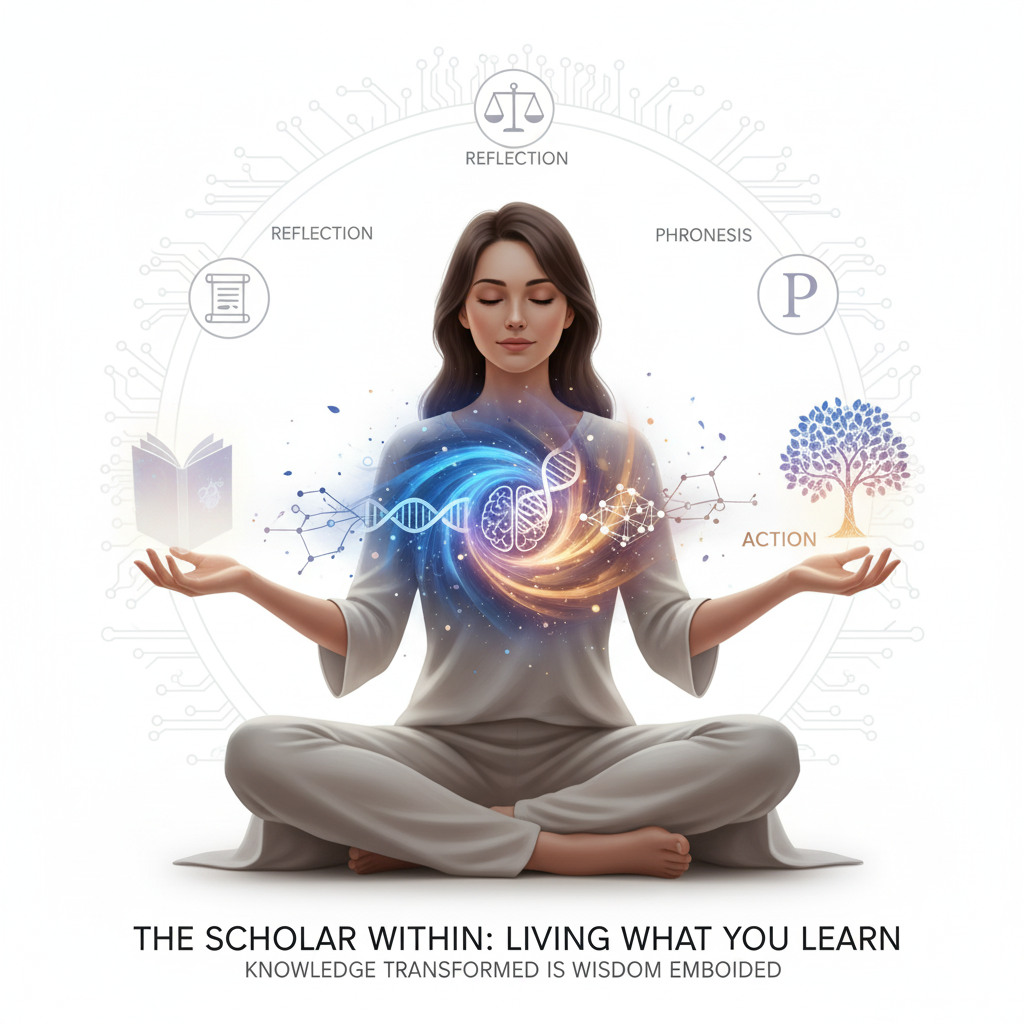The Scholar Within: Living What You Learn
Theme: Embodied Learning, Self-Mastery, and the Transformation of Knowledge into Wisdom.
Introduction
True scholarship transcends the act of acquiring information; it is the process of becoming what one studies. To live as a scholar is to transform knowledge into character and wisdom through continuous reflection and ethical action. It is not the accumulation of theories that defines a scholar’s legacy, but the daily choices that embody those principles in real contexts. My leadership journey is grounded in this philosophy of Embodied Learning. Each decision becomes an opportunity to integrate intellect with integrity, translating abstract understanding into tangible practice. Rather than pursuing knowledge as an external possession, I cultivate it as an internal discipline—learning that breathes, adapts, and responds with awareness. Through this lens, leadership becomes an evolving practice of self-mastery, where reflection fuels resilience and action refines wisdom. In this way, I am not simply studying leadership; I am becoming it—living what I learn and learning what I live.
Related Work
Key Philosophical and Psychological Concepts:
Aristotelian Phronesis (Practical Wisdom): The foundation of embodied learning, emphasizing knowledge of action (knowing how to act) rather than merely knowledge of fact (knowing what to know). This directly correlates practice with moral and ethical leadership (Aristotle, c. 350 BCE/1985).
Experiential Learning Cycles (Kolb): The continuous process of concrete experience, reflective observation, abstract conceptualization, and active experimentation, which governs the scholar's transformation of lessons into wisdom (Kolb, 1984).
Deliberate Practice (Ericsson): Acknowledging that the quality of action, not just the volume of action, leads to mastery. Embodied learning requires leaders to engage in purposeful, reflective practice in real-world contexts (Ericsson et al., 1993).
Character-Based Leadership: Theories defining leadership effectiveness not through competency alone, but through the consistent demonstration of ethical virtues and integrated personal values (Lennick & Kiel, 2007).
Dataset
Data Sources for Transformation:
Ethical Decisions Register: Documentation of complex decisions (positive and negative outcomes) where abstract knowledge (theory, principle) was tested against real-world pressure (integrity, cost, speed).
Reflection Artifacts (Journaling/Feedback Loops): Qualitative data derived from structured reflection on personal performance, internal cognitive conflicts, and the alignment (or misalignment) between stated values and actual behavior.
Contextual Action Records: Specific instances where learned principles (e.g., a systems thinking model, a conflict resolution theory) were immediately applied to a novel challenge, documenting the efficacy and the resulting emotional-cognitive state.
Longitudinal Character Profiles: Tracking the development and resilience of core leadership virtues (e.g., courage, humility, fairness) over time, noting how knowledge integration strengthens or weakens these traits.
Methodology
The Continuous Self-Mastery Loop:
Reflection (Input Processing): Immediately following a decision or action, the leader engages in structured deep reflection to deconstruct the event. This involves analyzing the gap between the intended theoretical outcome and the actual result, focusing on internal biases and assumptions.
Integration (Abstract Conceptualization): The insights from reflection are immediately mapped back to core philosophical or theoretical concepts. The knowledge is then re-written into the leader’s character—modifying internal values, priorities, or mental models.
Ethical Action (Testing/Embodiment): The newly integrated principle is deliberately tested in the next available opportunity. The leader seeks contexts where the transformed knowledge can be actively applied, ensuring that the intellect is always paired with integrity in practice.
Resilience Refinement: Learning from inevitable failures without externalizing blame, treating setbacks as data points for further integration, thereby strengthening emotional and cognitive resilience.
Results
Expected Outcomes of Embodied Learning:
Self-Mastery and Coherence: Achieve stronger alignment between personal philosophy and professional conduct, leading to clear, consistent, and authentic leadership.
Enhanced Decision Integrity: Decisions demonstrate higher ethical integrity and foresight because they are grounded in embodied character rather than situational expediency.
Accelerated Wisdom: The rapid cycling of the methodology (Reflection → Integration → Action) compresses the time required to transform experience into genuine, adaptable wisdom.
Modeling for Others: The leader's transparent practice of living what they learn inspires a culture of continuous development and ethical action within the organization.
Applications
Practical Implementation Areas for the Leader:
Integrated Decision-Making: Using the "Logic/Intuition/Empathy" framework (from the Octopus Mindset) but filtering all three through the lens of one’s integrated character (integrity).
Mentorship and Coaching: Moving from teaching prescriptive models to guiding mentees through the reflective process, focusing on character formation over skill transfer.
Crisis Response: Utilizing the deep resilience forged by reflective practice to maintain calm and ethical action under extreme pressure.
Strategic Planning: Ensuring that organizational strategy is not purely market-driven but is an embodiment of the organization’s highest purpose and values.
Resources
Foundational Texts (with Publication Details):
Aristotle: Nicomachean Ethics (Focus on virtue and phronesis).
John Dewey: Experience and Education (Foundation of experiential learning).
Stephen Covey: The 7 Habits of Highly Effective People: Powerful Lessons in Personal Change.
The Stoics (e.g., Marcus Aurelius): Meditations (Focus on self-mastery, internal discipline, and character).
Citation
Reference for the Internal Philosophy and Foundational Texts:
Aristotle. (c. 350 BCE/1985). Nicomachean Ethics. (T. Irwin, Trans.). Hackett Publishing.
Aurelius, M. (c. 170 CE/2002). Meditations. (G. Hays, Trans.). Modern Library.
Chandini, S. (2025). The Scholar Within: Living What You Learn. SheebaChandini LLC Internal Leadership Philosophy, Module 1.
Covey, S. R. (1989). The 7 Habits of Highly Effective People: Powerful Lessons in Personal Change. Free Press.
Dewey, J. (1938). Experience and Education. New York: Macmillan Company.
Ericsson, K. A., Krampe, R. T., & Tesch-Römer, C. (1993). The role of deliberate practice in the acquisition of expert performance. Psychological Review, 100(3), 363-406.
Kolb, D. A. (1984). Experiential Learning: Experience as the Source of Learning and Development. Prentice-Hall.
Lennick, D., & Kiel, F. (2007). Moral Intelligence: Enhancing Business Performance and Leadership Success. Pearson Prentice Hall.

